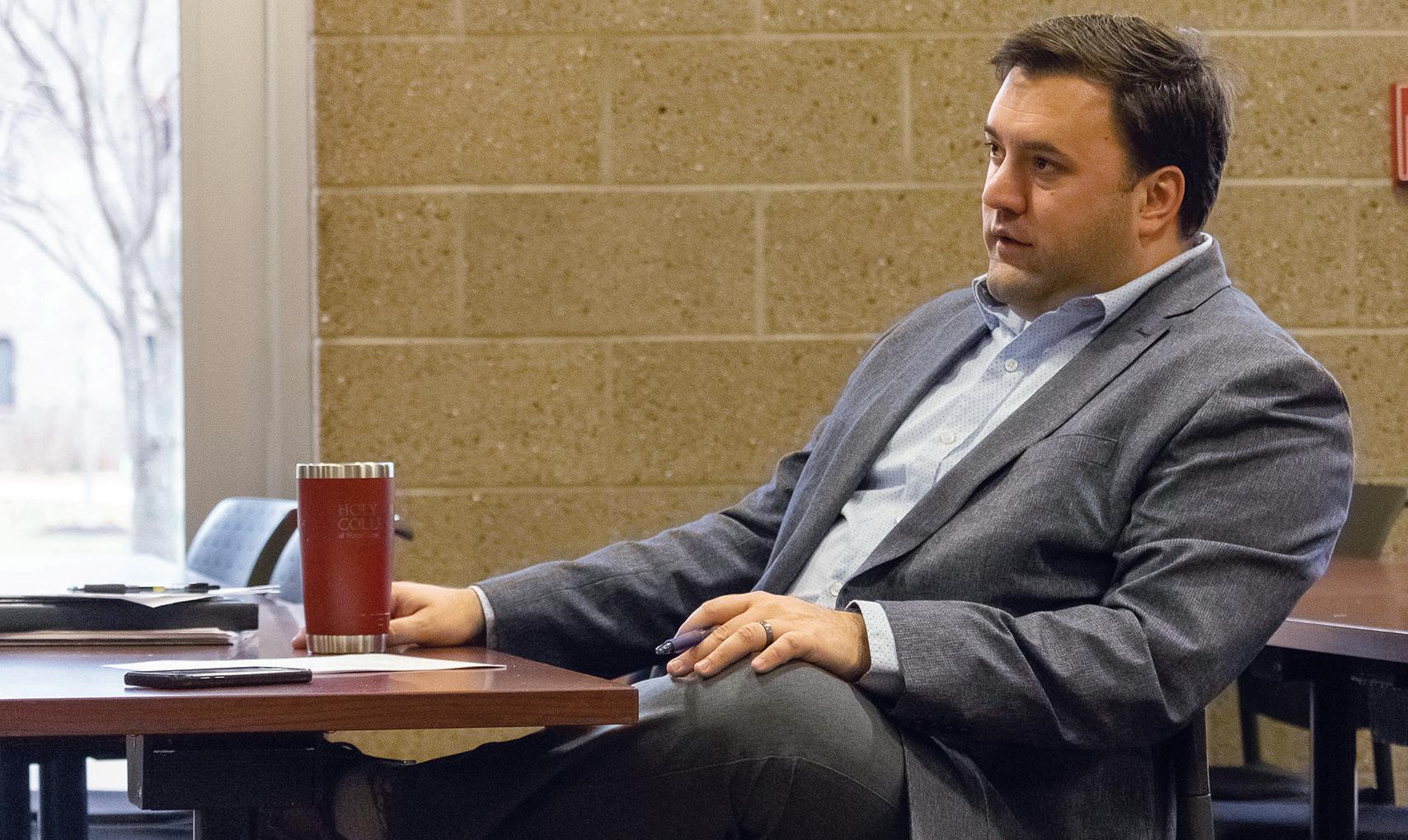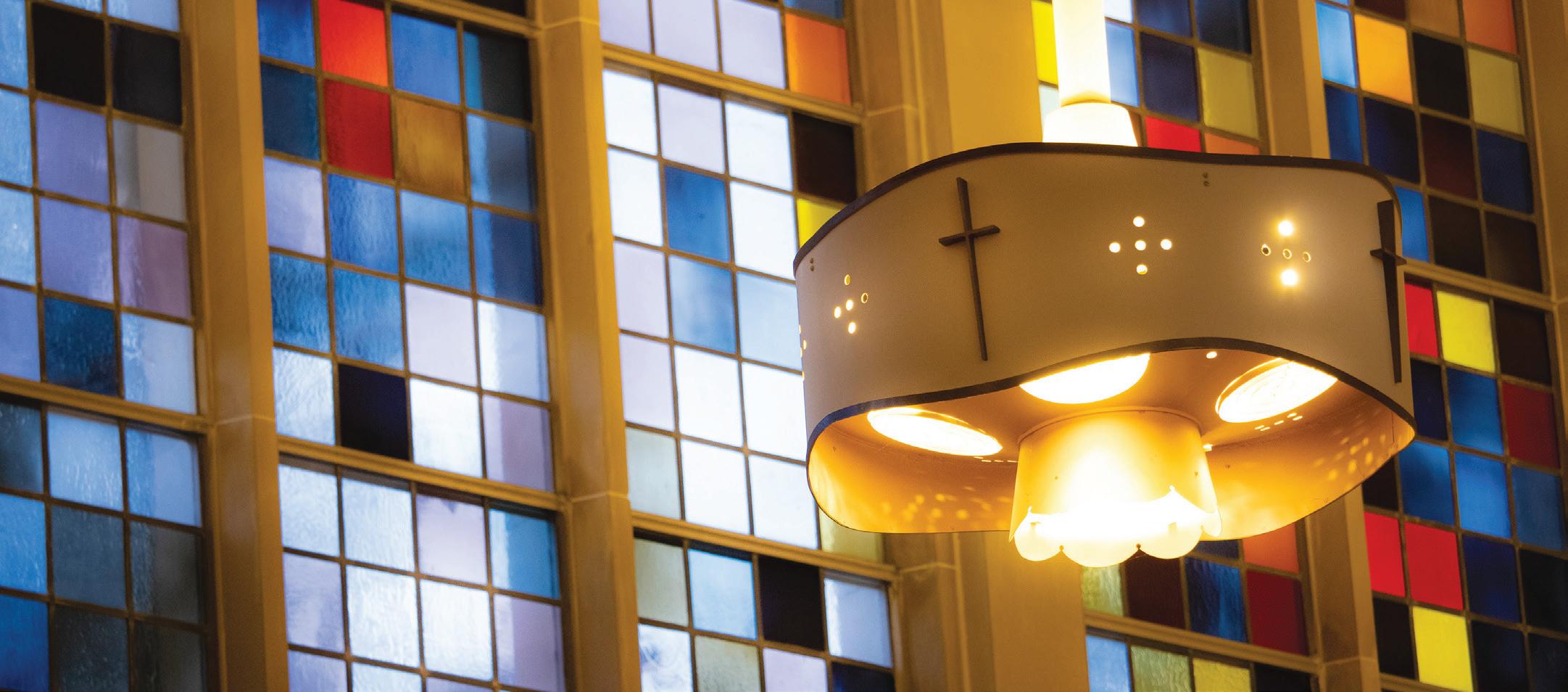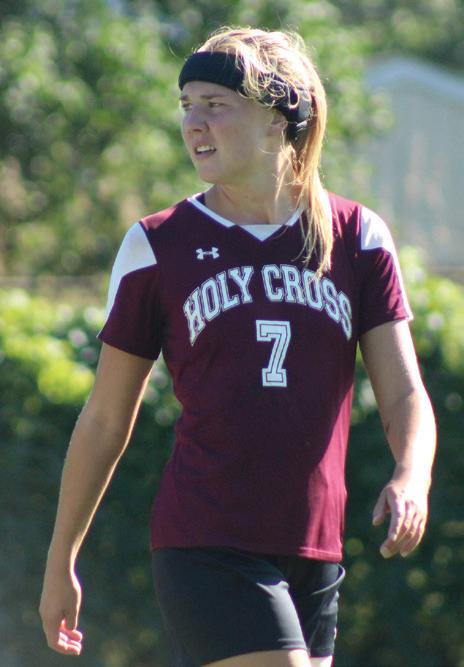
13 minute read
Liberated Minds
Ten minutes before he was scheduled to present, Olabisi Nard ‘20 looked down and said, “I changed my mind. I don’t want to do this.” In 10 short minutes, the now-empty room would be filled with an audience of faculty and his fellow students, all eager to hear him speak. “You’ve come too far to give up now,” I told him. “Just cross the finish line.” He was the last of my students to give his final presentation this year, and, although I knew he was ready, I also knew that what he needed was to feel ready. I just hoped my last-minute pep talk would be enough.
Like all Holy Cross College students, Olabisi’s college career was about to come to a close with his Capstone presentation. Unlike most, however, he wouldn’t be giving his presentation in the conference room at the Pfeil Center, and he wouldn’t be wearing a suit and tie. Instead, Olabisi stood at a battered table-top podium in a khaki jumpsuit, the walls were faded and pitted, and the windows fitted with prison bars. Also very unlike traditional Holy Cross students, Olabisi had been serving time almost as long as the average Saint has been alive. But like all Saints, this one short presentation was all that stood in the way of his graduation.
Olabisi was one of my students in the Moreau College Initiative (MCI) at Westville Correctional Facility. Although the students in MCI are fully Holy Cross students, and their names are on the same honor roll sheets and commencement programs as the students Liberated Minds
by Justin McDevitt, J.D., M.A.
Instructor, Moreau College Initiative Senior Capstone and Career Internship Director
at the main campus, they are still faced with constant reminders that theirs is a different road to walk to graduation. For example, while there are a small library and computer lab among the cluster of drafty classrooms at Westville, our students have no access to the internet, email or printers. All of the students’ assignments and papers are submitted either
handwritten or via two faculty members who have been granted thumb drive access. All of their research is done through faculty, graduates, and MCI’s AmeriCorps volunteer, but it can still take up to a week or more for any books or articles that they request to physically get out to them.
That said, a few of the other differences between the typical Holy Cross experience and that of our students in MCI are the result of thoughtful innovation by MCI’s founding director, Alesha Seroczynski, Ph.D. And, to that end, one of the most striking changes involves the Capstone itself. When I first met with Dr. Seroczynski in late 2017 to discuss coming on board to work with our first class of BA graduates, she took me to watch a few Capstone presentations in the Pfeil Center at the main campus. With each one we watched, I was impressed by the thought and care the students put into telling their journey: where they came from, their time at Holy Cross, and how the college has helped shape where they will go from here.
In Seroczynski’s vision, however, we had an opportunity to take our students at MCI even further. While still giving our students the chance to engage their personal narrative as part of the Capstone, she and I worked over the next few months to establish the Capstone as an independent research project, one chosen by each student based on a topic that was important to him personally, and research that stemmed from their own experiences and interests.
Essentially, we decided together that day that to graduate from the Moreau College Initiative with a Bachelors, each student would have to do independent academic research, write a 30-40 page Capstone thesis, then present it to a panel of MCI faculty and their peers. We knew it was a risk, as any departure is, but we wanted to challenge and empower our students in a way that not even the University of Notre Dame asks of its graduates (the Program of Liberal Studies excepted). We still wanted it to be deeply personal, but also academically rigorous, as our focus is on educating the whole person and preparing him for professional pursuits after release from prison.
And it showed. For the past three years, our students have consistently risen to the challenge, writing and presenting on topics from climate change and PTSD to gun violence and prison reform. I still remember a presentation last May when one of the correctional officers stood in the doorway and watched. It must have been strange to see one of his
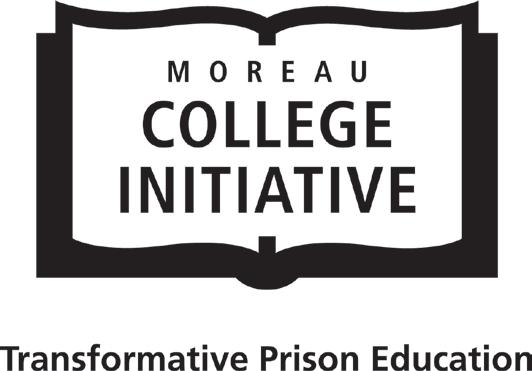
jumpsuited charges standing up in front of a classroom and speaking eloquently and volubly to a packed house on a fairly complex subject; but for us, it was exactly what we hoped would happen, and then some.
And it was for Olabisi, too. Throughout the course of the year, he researched the history and development of gangsta rap, coding lyrics and creating an original data set of major themes found in the genre over time. For Olabisi, the topic wasn’t just interesting, it was deeply personal. He recalled the influence that gangsta rap had on him and other young men in his community in his youth, and how that contributed to his decision to commit the crimes that landed him in prison in the first place. For our students, fusing rigorous academics with their lived experience is what makes our Capstone so unique and meaningful.
In the end, Olabisi would overcome his nerves and cross the finish line, just like I knew he could. He would stand at the podium presenting for 20 minutes and answering question after question for another 20 minutes. It was honestly one of the most compelling presentations I’ve ever seen in my academic life. Our students in MCI are capable of so much good; sometimes they just need to see that for themselves.
SPEAKER OFFERS INSIGHT INTO LIFE DURING THE Civil Rights Movement
— Dr. Martin Luther King, Jr.
As a way of demonstrating our commitment to the values that Dr. Martin Luther King, Jr. stood for, the Holy Cross College community came together to celebrate his life, legacy, and spirit. The celebration of Martin Luther King Jr. Day and the Civil Rights Movement was held on the campus of Holy Cross College in Driscoll Auditorium.
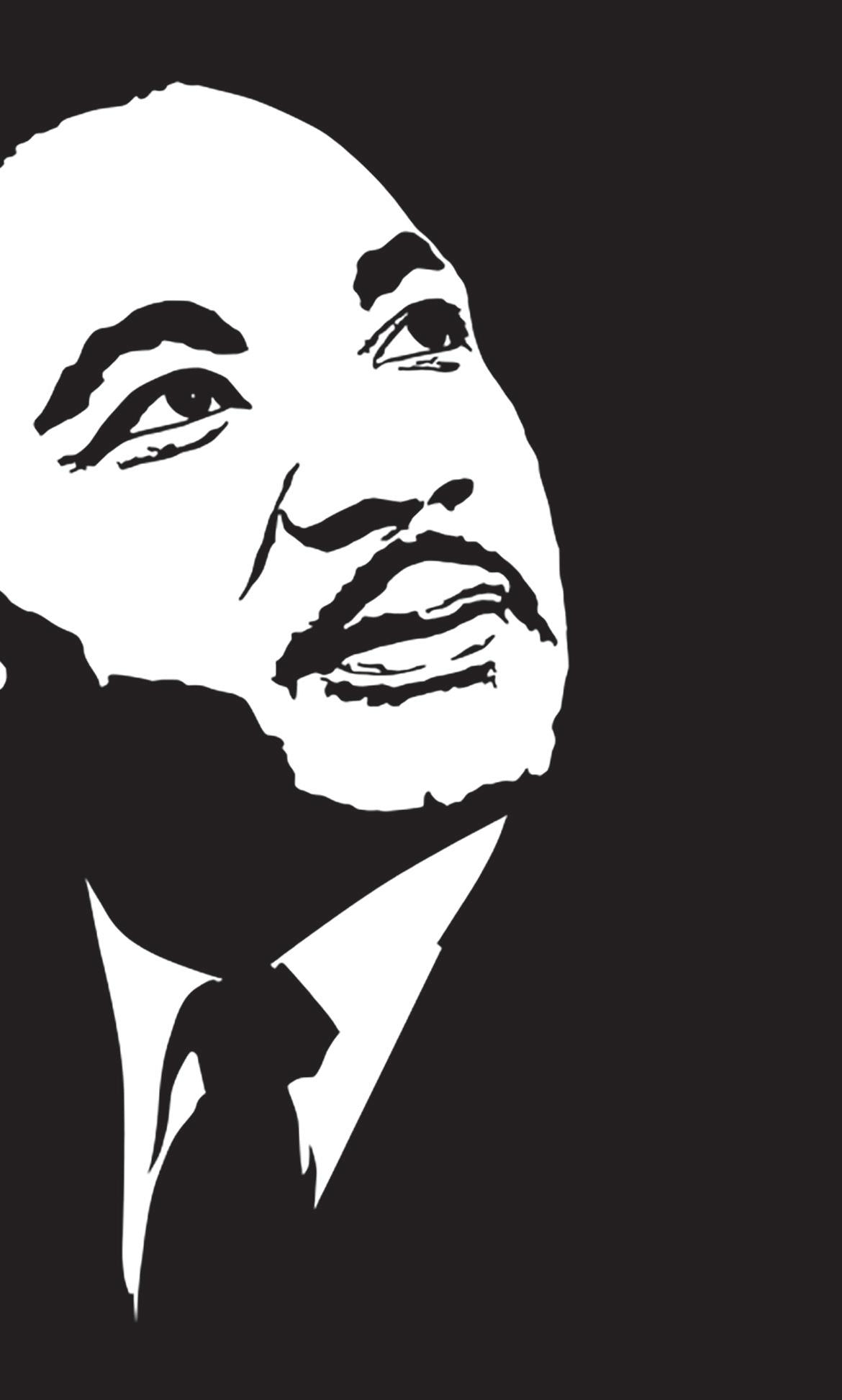
positively transform the lives of others in our communities.
Joining the celebration was guest speaker and civil rights activist Mr. Richard Morrisroe, a man who not only heard King’s message, but actively worked toward living a life focused on diversity and equality.
Students, faculty, staff, and administration welcomed the public to commemorate King’s values of courage, truth, and justice that defined his character and empowered his leadership. Through his work, he showed us how one person can make a difference, preached about tolerance and respect, and introduced new ideas inspiring countless people to take up the cause for diversity and equality. He demonstrated that together, with courage and compassion, despite challenge and controversy, we can

Morrisroe, now married with two adult children, earned a bachelor’s degree in philosophy from St. Mary of the Lake University, a master’s degree in urban studies from Loyola University, a law degree from Northwestern University, and a Doctorate of Ministry degree from Catholic Theological Union. As an adjunct faculty member at Calumet College of St. Joseph since 1981, he has taught courses in many courses including business ethics, social justice, and scripture studies.
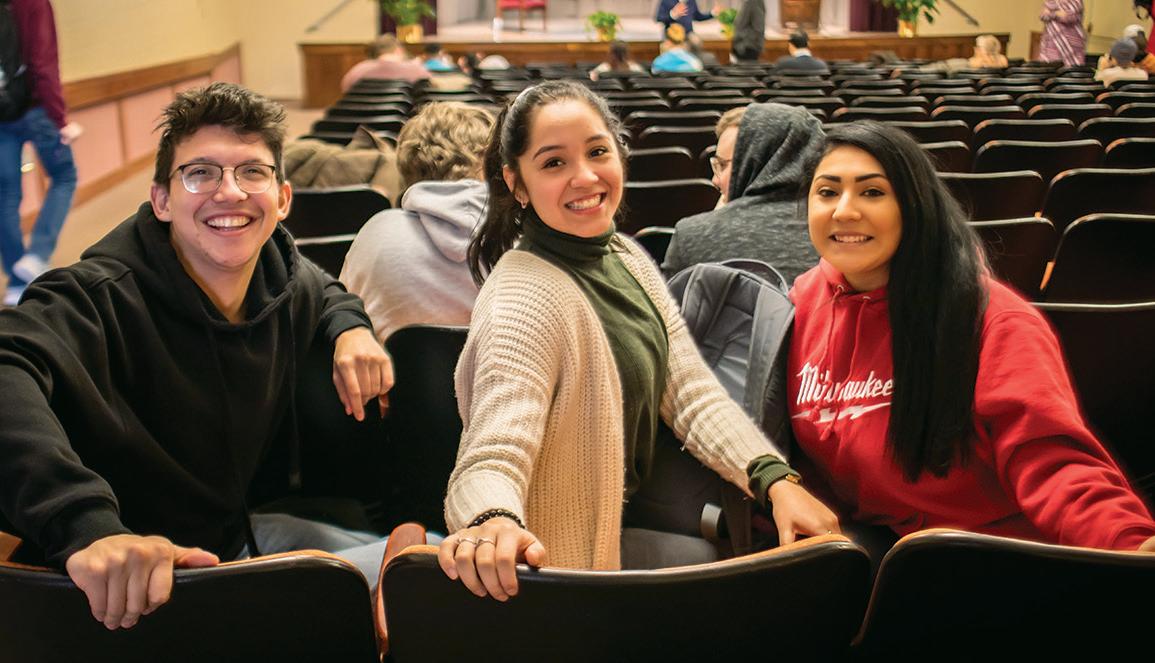

Before becoming a professor, Morrisroe spent some of his life following in King’s call, participating in non-violent demonstrations. In his time serving Chicago’s African American community, Morrisroe found himself increasingly involved in the Civil Rights Movement. This involvement led him to travel to the South where he had a life altering experience. Facing trials and overcoming challenges, losing a friend and almost losing his own life in the summer of 1965, Morrisroe never let these obstacles deter him from continuing to fight for what he believed in.
“Mr.Morrisroe presented a PowerPoint with slides of himself as a young priest in Alabama, and slides of Jonathan Daniels (civil rights activist). He told first-hand about the hatred he encountered, how he believed both Daniels and himself had been intentionally targeted, the lingering injuries he suffered and the efforts to save his life,” noted professor David Hoffman who assisted securing the visit by Morrisroe to the college. He also spoke about “the fact that his attacker, who was also Daniel’s murderer, was acquitted by an all-white jury and when a federal grand jury was convened to possibly bring federal charges against this murderer this jury seemed more concerned with the belief that Daniels and Morrisroe were ‘outside agitators’ than with bringing the murderer to justice.”
One memorable moment of the presentation for Hoffman was the knowledge shared that Jonathan Daniels,prior to being murdered, shared a jail cell with Stokely Carmichael.
“Carmichael, Daniels and Morrisroe were all working on behalf of Student Nonviolent Coordinating Committee (SNCC).Carmichael was African-American, while Daniels and Morrisroe were white. What I found somewhat sad is a year after Daniels was murdered, and Morrisroe almost killed, Carmichael voted with other SNCC members to expel white activists from SNCC. While I knew their reasons why, I instantly had an internal debate about whether this decision to expel was wrong from both a philosophical and pragmatic perspective,” said Hoffman.
Hoffman felt it was important for Morrisroe to speak at the college because many activists during that time in history have passed and this speaker allowed the community a chance to hear from someone who actually participated in, and almost died, supporting civil rights. What an honor to witness a piece of living history.
MARCH FOR LIFE EXPERIENCE INCLUDED FELLOWSHIP AND PRAYER
Holy Cross College students, faculty and staff members joined several hundred from the tri-campus area for the March for Life in Washington, D.C. This annual event allows visitors to witness and promote the dignity ofhuman life with the common purpose of demanding the legal protection of the unborn.
“At the same time, the experience also contains many other important aspects, including fellowship and prayer.The long hours of the bus ride and time spent just being together provides fertile ground for the sharing of stories and reflections as to how best we as a community and as individuals can support the vulnerable in our society,” said Dean of Students Andrew Polaniecki. “Recited rosaries, touching moments of prayer, and gatherings to celebrate the Mass are scattered throughout the mini-pilgrimage, providing depth” to the experience.

The travelers returned to Holy Cross at the beginning of the spring semester. “The March for Life experience was again a source of encouragement and hope as I go about work as an educator in faith,” noted Polaniecki.
Stepping on Stage: students partner with professional Shakespearean actor David Rubin


by Madelyn McBride, Gateway 7.0
On February 4, 2020, Holy Cross College English students stepped out of the classroom and onto the stage with direction from David Rubin, a professional Shakespearean actor. He was in South Bend to take part in the Actors from the London Stage program at the University of Notre Dame and has acted with the Royal Shakespeare Company, the National Theatre, the Old and Young Vic, and many regional theatre companies in the UK.
English Professor Anthony Monta created this collaboration between Holy Cross and the Actors of London Stage, a program based at the University of Notre Dame but part of the tri-campus community for over a decade.
To begin the hour and fifteen-minute session, David Rubin first claimed, “This play of Shakespeare wasn’t written to be studied, it was meant to be performed,” and performed they did. Using their whole body in active warm-up exercises and extravagant recitations, the students learned how to command the stage, observe details, and incorporate iambic pentameter through clapping, jumping, whispering, shouting, and more.
“A lot of the time I felt silly and uncomfortable, like when we did the iambic pentameter stomp, but ultimately I was glad I was engaging in my class material in a different way,” student Connor Brinkley ‘23 said.
For one of the early exercises, the students came up with an action to accompany their name. Every student then shared it, and the rest of the class mimicked every moment in order to display the importance of nonverbal acting. Additionally, they used their hands and feet when reviewing rhythm, a crucial aspect of Shakespeare. “Mr. Rubin really made me think about the way I present myself through body language not only on the stage but in everyday life. It definitely opened my eyes to how sometimes our bodies speak louder than our words,” student Christina Randazzo ‘23 shared.
After a few more warm-ups, the class worked together to perform an excerpt of “The Tempest.” Each student given a line to recite, the scene included intentional body language and dominant voices.
“I thoroughly enjoyed the opportunity to act out a scene from “The Tempest.” Not only was it fun, but I believe being in a character’s shoes will allow me to understand the thoughts and words better when I am reading them,” student Mikayleigh Clark ‘22 said.
As the workshop went on, every student’s confidence rose as they assumed the role of “actor;” their laughter and joy filled the Driscoll Auditorium. “This unique perspective, that was so free of academic restraint, motivated me to engage more in his workshop. It also informed my way of reading Shakespeare. Now, I think more about literary devices that can be projected on the stage like tone and imagery as opposed to devices more suited for a poem or novella like metaphor,” student Oscar Kasch ‘23 said.
The excitement didn’t stop here. All the students who participated in the workshop attended the production of “The Tempest” at the University of Notre Dame February 7, where Rubin played the roles of Prospero and Antonio. The tickets were generously supported by Division Chair and Professor of Psychology Doris Van Auken, Ph.D. With the students currently engaging with “The Tempest” in class, this opportunity continued to bring Shakespeare to life.


– Anthony Monta, Ph.D., English Professor
54515 S.R. 933 N. P.O. BOX 308 N OTRE DAME, IN 46556 54515 S.R. 933 N. P.O. BOX 308 N OTRE DAME, IN 46556
Address Service Requested Address Service Requested







